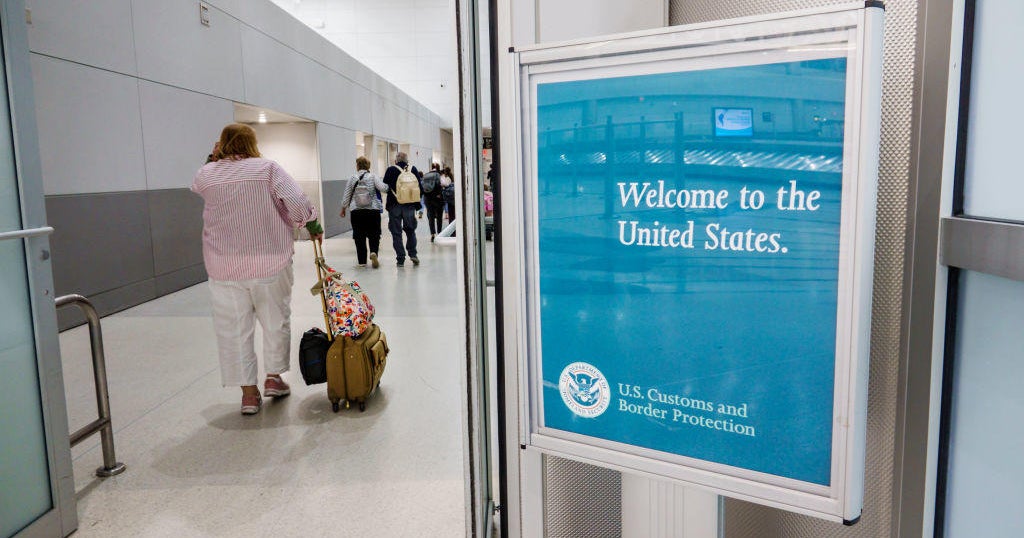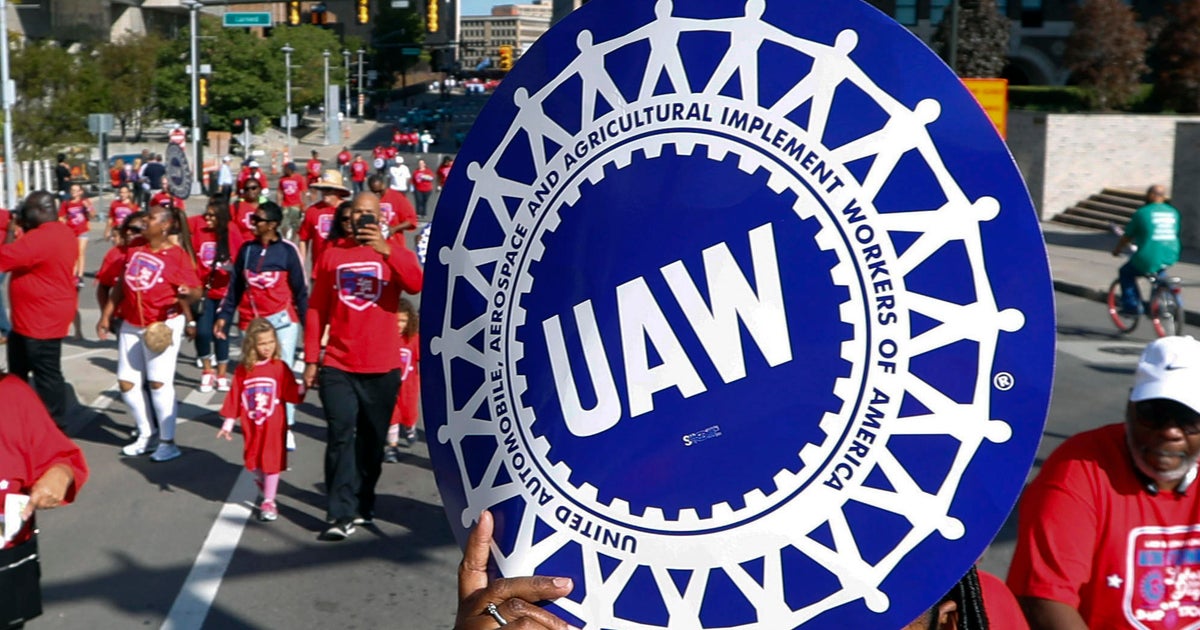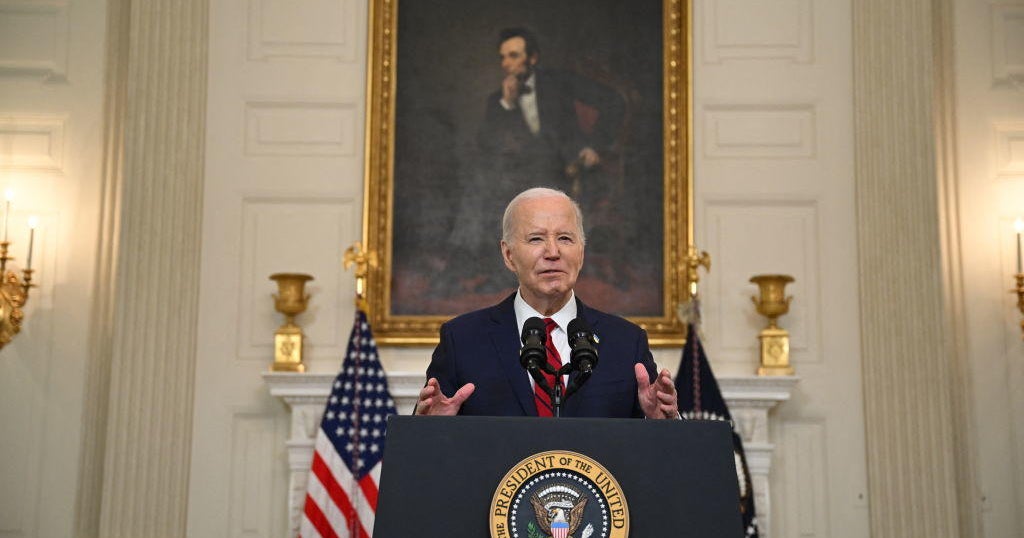Divided on details, Democrats pursue "two tracks" on infrastructure legislation
Washington — Although a bipartisan group of senators reached a tentative deal on infrastructure legislation last week, congressional Democrats are preparing to forge ahead with a process to pass a larger proposal — without any Republican votes, if needed.
Backed by the White House, congressional Democrats are pursuing a "two track" strategy. One track would continue negotiations with Republicans, while the other is preparing for budget reconciliation, a lengthy and complicated process that would allow legislation to pass with a simple majority. Two tracks may be necessary, too, because progressive Democrats are losing patience with the ongoing negotiations.
A group of five Republicans and five Democrats announced last week that they reached an agreement for a proposal that would include $579 billion in new spending over five years. This is significantly less than President Biden's $1.7 trillion proposal, a slimmed-down version of his initial $2.3 trillion offer.
Senate Majority Leader Chuck Schumer told reporters on Tuesday that he would convene a meeting with the Democratic members of the Senate Budget Committee to discuss taking up a budget resolution, the first step in the reconciliation process. He added that he wanted a bipartisan infrastructure bill and a budget resolution that "goes beyond what's in the [bipartisan] bill" passed in July.
According to a senior Democratic aide, Schumer will urge the 11 Democratic members to support a "unity budget" to be presented to the full conference in early July, and instruct them to include provisions related to climate and "caregiving," meaning "human" infrastructure such as child care, health care, and education. Schumer will note that the American Families Plan will not be supported by Republicans, and therefore must be included in the reconciliation bill.
Senator Tim Kaine, one of the Democratic members of the Budget Committee, suggested to reporters on Wednesday that even if a bipartisan deal was not reached, Democrats could include the bipartisan provisions in a larger reconciliation bill.
"I'm sure we will want commitments from members that this is the vehicle we will use for anything that is not in a bipartisan bill, and again, even if we don't do a bipartisan bill we're going to put the bipartisan priorities into a reconciliation bill so that gives me confidence we will eventually get there," Kaine said.
Any bipartisan bill would need universal support from all Democrats in the Senate, given the narrow Democratic majority. Democrats only hold 50 seats, meaning that they would need support from at least 10 Republicans to meet the 60-vote threshold to advance a bill. But if a few Democratic senators vote against the bill, the loss would need to be compensated with more Republicans voting for it, which is an unlikely scenario.
However, moving forward with reconciliation would require the support of all 50 Democrats as well, which is not a guarantee. Senators Joe Manchin and Kyrsten Sinema, who are part of the bipartisan group negotiating a deal, have expressed unwillingness to use reconciliation. Neither has publicly committed to supporting a reconciliation package including climate provisions and "human" infrastructure if the bipartisan deal is passed either.
Manchin told reporters on Wednesday that he could not commit to supporting a reconciliation bill.
"I would never ask any of my colleagues for an ironclad commitment, unless I could justify it and show them the facts of why I would hope they would work together with me, agree with me. And I expect the same from them," Manchin said. "I'm not a no, I'm not a yes, I'm basically just evaluating everything they put out."
Congressman Hakeem Jeffries, the House Democratic Caucus chair, said Tuesday that the White House had urged them "to proceed on two tracks." House Democrats met for their first in-person caucus meeting since the beginning of the coronavirus pandemic on Tuesday, where they heard from Biden administration officials who laid out the "two track" pathway.
Speaking with Jeffries after the caucus meeting, Congressman Pete Aguilar noted that much of what was included in Mr. Biden's American Jobs Plan was broadly popular with the American people — Republicans and Democrats — which would justify moving forward without support from congressional Republicans.
"We won't give this process longer than we need to," Aguilar said.
Congressman John Yarmuth, the chair of the Budget Committee, told reporters that he expected Democrats to hold a markup on a resolution for budget reconciliation in July. He said that provisions included in Mr. Biden's American Jobs Plan and American Families Plan that are opposed by Republicans, such as shoring up "human" infrastructure of child care and home care, would be included in such a resolution.
"Neither precludes the other," Yarmuth said of continuing negotiations and preparing a budget resolution. He added that Biden administration officials told House Democrats that the White House would give the bipartisan negotiations seven to 10 days to solidify a deal.
Many Democrats harbor concerns about whether some of their priorities will fall by the wayside in the negotiated bill, such as provisions to address climate change and invest in green infrastructure. Congresswoman Debbie Dingell told reporters on Tuesday that she would not vote for a bill that did not include provisions on electric vehicles.
"At some point, you've got to fish or cut bait," Dingell said about the timing for continued negotiations. "We have to get an infrastructure bill done this summer. Period. And we can't talk it to death. It's got to happen."
Dingell also noted that the bipartisan House Problem Solvers Caucus has introduced their own framework for physical infrastructure that would include provisions on electric vehicles, and offer $761.8 billion in new spending over eight years.
GOP Senator Susan Collins told reporters that the bipartisan proposal includes some funding for electric vehicle charging stations, but said "it's far less than the president's plan." She also said that it would not include funding for electric vehicle rebates.
Another sticking point for Democrats is how to fund the legislation. Republicans have balked at Mr. Biden's proposal to increase the corporate tax rate from 21% to 28%, and set a minimum corporate tax rate of 15%. But Mr. Biden appears unwilling to use unspent coronavirus relief funds or index the gas tax to inflation, two pay-fors Republicans and a few Democratic senators have floated.
Progressives have already indicated their distaste for the bipartisan proposal. Senator Bernie Sanders, the chair of the Senate Budget Committee, said Monday that he would not support the bipartisan bill, saying that any measure "has to be paid for in a progressive way" to address income inequality.
"The way we should, to the degree that we can, fund infrastructure and the other needs of the American people is by demanding that the wealthiest people and large powerful corporations start paying their fair share of taxes. I think in both of those respects the so-called bipartisan bill is lacking," Sanders told reporters on Tuesday.
Senator Ron Wyden, the chair of the Finance Committee, said Tuesday that he also believed "most of what is being discussed in this effort would heap new taxes on working people."
"I am not going to raise new taxes on working people and let mega-corporations and the wealthy off," Wyden said.
Senators Ed Markey and Jeff Merkley indicated that they would not support the bipartisan bill.
"It's time for us to go our own way," Markey told reporters in a press conference, referring to reconciliation. Merkley said he would "absolutely not" support a bipartisan bill without a commitment to also passing a reconciliation bill including climate provisions.
Senator Elizabeth Warren echoed her colleagues' concerns on Tuesday, telling reporters that she "can't support any infrastructure package that does not include child care, clean energy and requiring the rich and powerful to pay a fair share to get this done."
But Senator Chris Coons, a staunch ally of Mr. Biden in the Senate, told reporters on Tuesday that "we don't have an alternative" to the "two track" process, despite potential dissension from booth progressives and moderates.
"The most credible path forward is to do as much as we can in sort of traditional hard infrastructure through a bipartisan bill, and have us then proceed by reconciliation to do as much of the Biden agenda, which I strongly support, as we can accomplish with 50 Democrats," Coons said.
Rebecca Kaplan, Alan He and Jack Turman contributed reporting.




